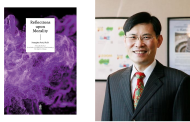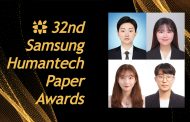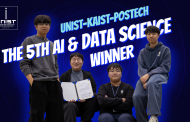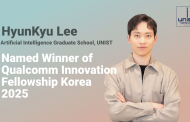The Intelligent Remote sensing and geospatial Information Science (IRIS) Lab, led by Professor Jungho Im in the Department of Civil, Urban, Earth, and Environmental Engineering at UNIST, is gaining significant attention for its research in artificial intelligence aimed at addressing critical environmental issues. In 2024, the lab has garnered multiple prestigious awards at both domestic and international competitions and academic conferences.
■ Winning Grand Prize at the 2024 Satellite Information Application Contest
In November 2024, Team Olympus from Professor Im’s lab won the Grand Prize at the 2024 Satellite Information Application Contest, organized by the National Aeronautics and Space Administration (NASA). Team members Tobias Rogelio Ruzcko, researcher SeJong Bae, and SwanHee Cho successfully utilized a deep learning algorithm called the “Mamba architecture” to enhance the accuracy of change detection technology based on satellite imagery.
Researcher Ruzcko remarked, “The integration of artificial intelligence with remote sensing has produced remarkable results,” and acknowledged, “The collaboration with my team members was instrumental.” Researcher SeJong Bae added, “We faced challenges in implementing our ideas, but we are delighted to have overcome them together and receive this award.” Student Hwan Hee Cho noted, “It was a journey filled with challenges and learning experiences. I am grateful to my team members and professors.”
■ Winning Outstanding Paper Award from KAGIS
Researchers Soomin Hwang and SeJong Bae received Outstanding Thesis Awards at the 2024 Spring Annual Conference of Korean Association of Geographic Information Studies (KAGIS). Ms. Hwang developed an innovative algorithm for long-term carbon dioxide restoration using artificial intelligence, enhancing the applicability of the research. Ms. Bae contributed by employing satellite imagery to estimate urban tree cover, opening new avenues for analyzing urban environmental conditions.
■ Best Paper Award at the GeoAI Data Conference
Building on their success at the Spring Conference, Professor Im’s lab secured the Best Paper Award at the subsequent 2024 Autumn Conference of the GeoAI Data Conference. At the Spring event, SiWoo Lee presented a methodology for analyzing urban heat island phenomena and their environmental impacts using artificial intelligence, while researcher SiHun Jung showcased a long-term prediction study of North Pacific sea surface temperatures based on deep learning techniques.
At the Autumn Conference, researcher SeYoung Yang presented groundbreaking research on monitoring global high-resolution methane plumes using deep learning algorithms and hyperspectral instruments. Additionally, researcher So-Hyun Kim garnered attention for his work on semi-real-time interpolation of surface salinity in rivers using advanced deep learning methods.
■ Winning Multiple Accolades at the Korean Society of Remote Sensing Conference
Professor Im and his research team received a multitude of accolades at the 2024 Autumn Annual Conference of the Korean Society of Remote Sensing (KSRS) Conference, held in Seoul in October. Professor Im earned the Academic Achievement Award for having the most cited papers published in SCI-level journals over the last two years. Researcher TaeJun Sung received the Excellence Papers Citation Award for his research on estimating high-resolution surface salinity using various satellite data and machine learning techniques. Researcher YoungSeok Kim was awarded the Excellence Papers Presentation Award for his investigation into detailed surface temperatures using machine learning and analyzing the impact of COVID-19 on urban heat islands in Daegu.
■ Recognition Award from KOSAE for Oral Presentation
At the 67th Regular Academic Conference of the Korean Society for Atmospheric Environment (KOSAE), researcher SooMin Hwang was honored with a prize for encouraging oral presentation for his study on developing high-quality carbon dioxide restoration algorithms globally using artificial intelligence. The research was praised for overcoming the limitations of satellite imagery and delivering high-quality data.
Professor Im expressed his pride in the laboratory’s achievements, stating, “I am thrilled that our team members have demonstrated their capabilities and achieved outstanding results.” He added, “I look forward to our research making a positive impact on society in the future.”


![[Lab News] Professor Jungho Im’s Team Celebrates A Series of Awards for Environmental and AI Research](https://news.unist.ac.kr/wp-content/uploads/2024/12/썸네일-_2024-위성정보활용-경진대회-800x505-800x505.png)









